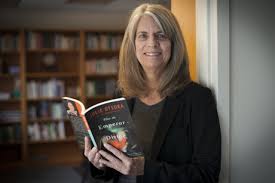The Reading Project
In the summer of 2013, Cornell’s new students will be reading Julie Otsuka’s When the Emperor Was Divine. Published in 2002, When the Emperor Was Divine tells the story of an ordinary American family caught up in extraordinary political circumstances. Otsuka’s novel describes a Japanese American family’s three-and-a-half-year long experience in the internment camps during World War II. From varied perspectives—the two young children, the mother, the internment community, and finally the father—the novel offers a concrete view of personal struggle, dignity, and tragedy in a context of exile and racism, which is widely resonant historically and in our own time.
When the Emperor Was Divine is most admired for its clarity of detail and its integration of distinct viewpoints into a singularly powerful rendering of historical experience. In describing the broader relevance of her novel, Otsuka says, “I wanted to write a novel about real people. . . their experience is universal not only for Japanese Americans, but for people of any ethnic group. All throughout history people have been rounded up and sent away into exile. The predicament of the family in my novel—ordinary people caught up in extraordinary circumstances beyond their control—is a very human one.”
Julie Otsuka is a recipient of the PEN/Faulkner Award, the Asian American Literary Award, the American Library Association Alex Award, the Arts and Letters Award in Literature from the American Academy of Arts and Letters, and a Guggenheim Fellowship. She has also been a finalist for the National Book Award. When the Emperor Was Divine has been translated into six languages and has sold more than 250,000 copies.
When the Emperor Was Divine generates a range of engaging topics for discussion and exploration, including the political context of World War II, issues around immigration and exile, post-9/11 experiences of Arab Americans and Muslim Americans, cultural difference and intercultural dialogue, civil liberties and human rights, memory and trauma, scapegoating, the recording and documenting of internment experiences, and the impact of such experiences on children and families.
At orientation in August, 2013, the New Student Reading Project will organize six Cornell Contexts presentations, enabling students to explore topics, disciplines, programs, and materials related to some of the contexts of When the Emperor Was Divine. The Cornell Contexts presentations will reflect a wide range of current, creative, topical, academic, or intellectual approaches, showcasing the range of schools, colleges, venues, opportunities, and areas of study at Cornell. When the Emperor Was Divine will also be the subject of discussion in small Reading Project Seminars led by faculty and staff, scheduled for all new Cornell students.
–Laura Brown, Vice Provost for Undergraduate Education

